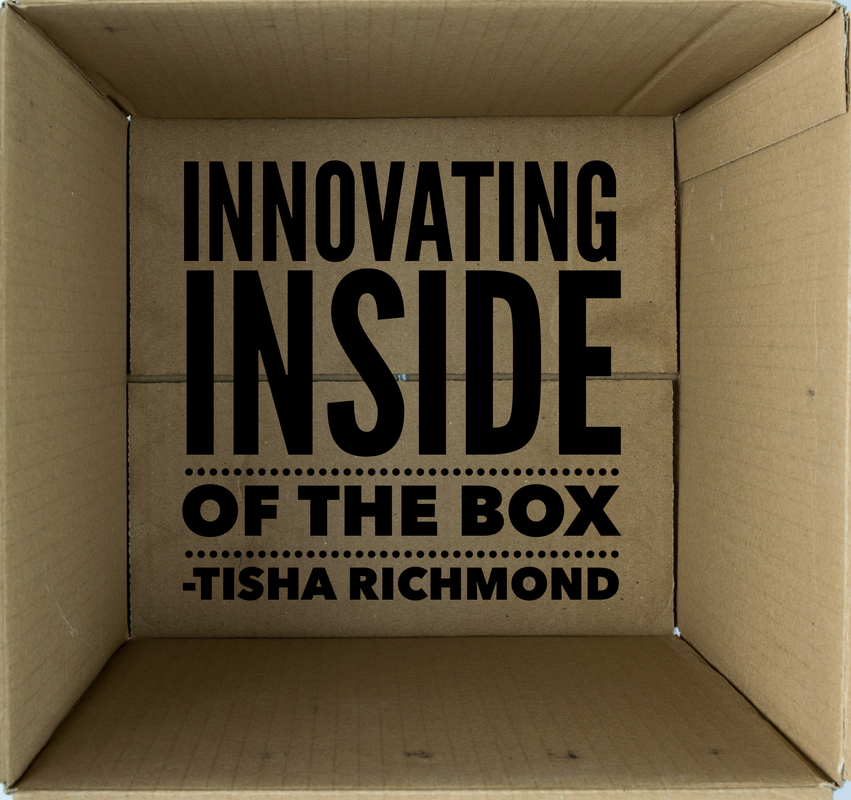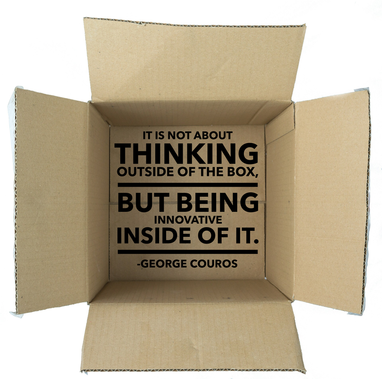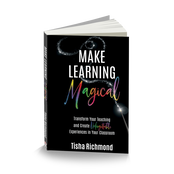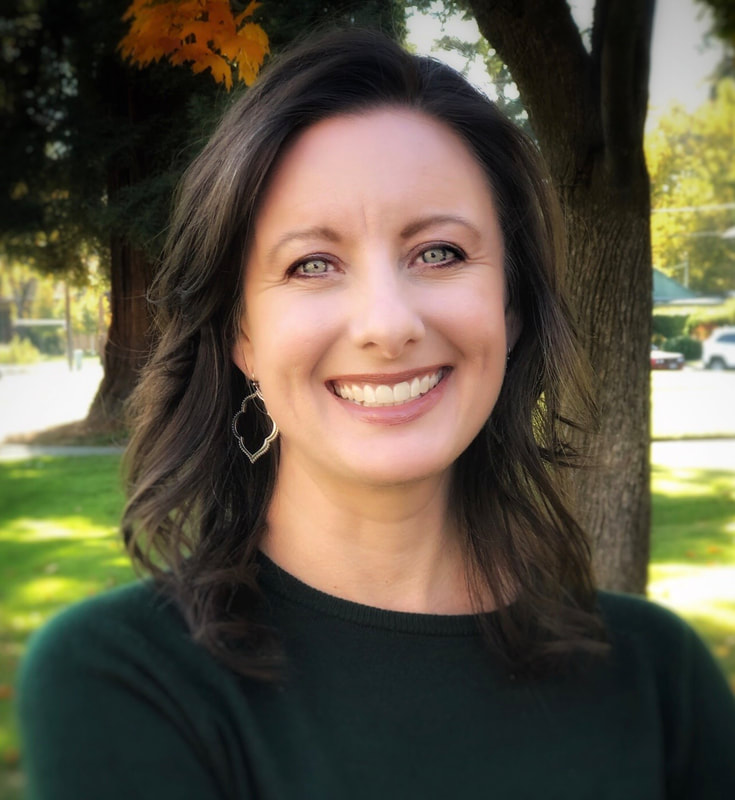|
Everywhere I turn I find frustrated teachers. These words echo in my head from bits of conversations I hear...
Kids today... ...they want to be entertained ...they don't show up on time ...they are entitled ...they lack focus ...they are lazy ...they don't meet deadlines ...I'm stressed ...so much pressure ...too many initiatives ...too many students ...too many hoops ...not enough time... Sound familiar? This week was an extremely difficult one for me. I just started a new semester with new kiddos, and have half of the energy I started with at the beginning of the school year. It took everything in me to fight these thoughts from creeping into my mind. I'm exhausted, frustrated, and overwhelmed. I pushed the negative back by taking some time to reflect on what I do and how I do it. The words "innovate inside of the box" came to mind, so I picked up one of my favorite books, Innovator's Mindset, and began reading... "Let’s not kid ourselves. In education, especially the public sector, schools are not overloaded with funding. Innovating in our schools requires a different type of thinking, one that doesn’t focus on ideas that are “outside of the box” but those that allow us to be innovative despite budgetary constraints. In other words, we need to learn to innovate inside the box." -- George Couros Many of us in education can say our schools are lacking either funding, resources, time, technology, or support... It's the box we live in. However, it's how we innovate inside those constraints that make the difference. Do we focus on all the limitations we have, or do we get creative and think about how we can do something new and better within the box we are given. George Couros talks about the following 8 Characteristics of an Innovator's Mindset in his book and now as I read them again, I realize the extreme degree my mindset has shifted over the past few years and how it truly has saved me from the frustrations and burn out that so many educators face. 1. Empathetic - I am continuously asking myself the George Couros question, "Would I want to be a learner in my own classroom?" We can't expect our students to respond to the same methods of learning that we did. They are growing up in a different era. When we put ourselves in their shoes and see the world as they do, we will create learning experiences that are powerful. Inspired by Tara Martin’s BookSnaps idea, my students create FoodSnaps to reflect on their creations using Snapchat; a tool that speaks their language. This is just one example of finding ways to create learning experiences that meets students where they’re at. 2. Problem Finders/Solvers - I spend a lot less time on posing problems to students, and let them find the problems instead. So much learning happens when we get out of the way and encourage our students to find their own solutions. They become empowered and truly make learning their own. Instead of feeding students tons of information to consume, I now have students find this information on their own as well as find and solve their own problems. To take it further, creating authentic audiences by inviting in restaurant owners and staff for students to share their learning with takes it to a completely different level as the relevance and meaning skyrockets. 3 . Risk Takers - For many years, I waited for perfect before I launched a new idea or lesson. The reality was, more often than not, perfect never came and I just continued maintaining the status quo in fear that my new idea would fail. Since embracing an Innovator’s Mindset, I don’t fear risk taking anymore. I am continually pushing the boundaries of what’s possible to create amazing experiences for my students. Those ideas and lessons do fail at times, but the wins far outweigh the losses and I’ve grown leaps and bounds in the iterative process of refining my practice. I also have found that modeling that risk taking with my students is so vital.. Students get used to my crazy ideas and embrace them as we learn together. Experiencing my boldness in teaching gives them the freedom to risk boldly too. So much growth happens when we take big leaps. 4. Networked - There was a time that I lived in a culinary silo. I went through my school days feeling isolated and alone. How could anyone relate to my world of Chef’s knives and saute’ pans? I was so wrong. Once I discovered Twitter and began developing a Professional Learning Network, a whole new world opened up to me! I realized that that it was ridiculous to remain in a culinary silo when there were educators from across the educational spectrum from Kindergarten through Higher Education that I could not only learn from, but collaborate with! I begun to share the learning that was happening in my class and found ways to integrate the ideas I was learning from other educators into my class as well. I started participating in and even moderating Twitter chats to develop deeper connections. I joined in Voxer communities to discuss books and topics that I was passionate about. Without a doubt, I’ve grown exponentially as an educator since I’ve become globally connected. 5. Observant - George Couros says, “Sometimes the most valuable thing you get from the network ins’t an idea but the inspiration or courage to try something new.” I find this to be so true. I have become so much more courageous in my teaching as I’ve been inspired by my PLN. I look at my world through a new lense now as well. When I read, run, hike, watch TV, people watch, and go through my normal day to day life, I am continuously looking for inspiration to bring into my classroom. It is amazing how many ideas are just waiting for us to grab hold of them and make them our own brand of awesome! 6. Creators - Learning is powerful when students go beyond consumption to creation. My classes are creation-based by nature; students are collaborating on a daily basis to create amazing food. However, creating has taken on a whole new meaning as students are not just following recipes, but taking the skills and techniques they learn to make something entirely new. Empowering students to make learning their own by coming up with their own creations is one of the most powerful things to experience as an educator. To see their face light up with pride as they present their unique and delicious dishes makes my heart leap with joy. Learning becomes so much more rich and meaningful when we give students opportunities to create and connect at this level. 7. Resilient - This past week my students reviewed safety and sanitation by working in teams to solve a digital breakout. I have never seen my students so engaged and immersed in learning about safe food handling practices and during my 7th block of the day! It was difficult and challenging, but they were all in! Well, all but one student whose comment made me internally bristle, “Mrs. Richmond, why don’t you just have us do a worksheet…it would be easier.” Well, yes it would be easier…much easier. Though, I will guarantee that the answers that are regurgitated from that worksheet would not be retained or hold as much meaning as what is learned from the critical thinking and collaborating that happened as students gathered around to unlock the series of digital break out clues. How often are we encouraging our students to stretch their thinking? Are we feeding them the answers, or challenging them in a safe environment where they can take risks, fail, and risk again? Additionally, I’ve come to realize that not everyone is going to agree with my approach to teaching and learning. It hurts sometimes, but I know what I’m doing works because my students are evidence of that. I have to continue doing what I know is working, even when others don’t see the value or agree. 8. Reflective - One of the most powerful things I’ve begun to do as an educator is reflect regularly. Blog writing has become a wonderful and powerful way for me to not only document and share my learning, but to reflect on it myself. The more I do it, the more I crave it. I am able to make deeper connections as I put my practice into words and truly think about what is working and what is not. I also love to sketchnote my learning. When I read a book, attend PD, or listen to a podcast, I often will sketch my learning during and after to make deeper connections and allow it to resonate. As George states, “Looking back is crucial to moving forward.” Having my blog posts and sketchnotes to look back on has been powerful for me as I continue to learn and grow as an educator. I can’t express enough how powerful these Innovator’s Mindset characteristics have been in my EDUjourney. They have helped transform me as an educator as I embrace “change as an opportunity to do something amazing”! As I hit the midyear mark this week, I can tell you, I am EXHAUSTED! Teaching is extremely hard work. We invest so much of ourselves in the lives of kids. There are days I am frustrated, tired, and feel like I do not have an ounce of energy left. All that to say, since developing an Innovator’s Mindset, those days don’t define me as an educator. No matter how strong my feelings of frustration or exhaustion gets, my passion for teaching and learning is stronger. Innovation is contagious! Don’t get stuck in your box….find ways to do something amazing within it. The more you innovate, the more you’ll crave it!
5 Comments
|
Tisha RichmondStudent Engagement & PD Specialist in Southern Oregon, Canva Learning Consultant, Canva Education Creator, and author of Make Learning Magical. I'm passionate about finding innovative ways to transform teaching and create unforgettable experiences in the classroom. |
- HOME
- SPEAKING
- ABOUT ME
- BLOG
-
RESOURCES
- Memorable Beginnings >
- Authenticity & Agency
-
Gamified Experiences
>
- Anywhere Learning Plans
- The Amazing Race Game Plan Resources
- The Race to the Golden Ticket
- Ready Player One
- The Amazing Food Truck Race
- The Great Interior Design Challenge
- The Final Table Challenge
- Challenge Rubrics
- Challenge Ideas
- Kitchen Utensil Race & Other Variations
- Code Names for the Classroom
- Badges
- Innovation
- Creativity, Curiosity, and Collaboration
- Authentic Audience
- Legacy
- Make Learning Magical Book
- PODCAST
- T-SHIRTS
- YOUTUBE
-
RECIPES
- Workshop & Session Resources
- Dragon Smart Reviews
Proudly powered by Weebly





 RSS Feed
RSS Feed